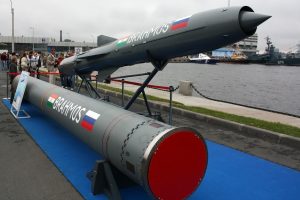The Philippines government could sign an agreement for the purchase of the Indo-Russian BrahMos cruise missile early next year, after a COVID-19-induced delay, according to media reports.
The Philippines has long expressed interest in purchasing the advanced weapons system, which has been jointly developed by the Russian and Indian governments. In December 2019, Philippine Defense Secretary Delfin Lorenzana announced that that Philippines was preparing to purchase two batteries of BrahMos missiles, as part of the Armed Forces of the Philippines’ 2018-22 modernization program. (Each battery includes three mobile autonomous launchers with two or three missile tubes each.) “Signing of the contract will be in 2020. Possibly on the first or second quarter,” he said, according to the state-run Philippine New Agency.
The COVID-19 pandemic appears to have delayed the purchase, but it seems likely to go ahead as soon as early 2021.
The reports came after Roman Babushkin, Russia’s deputy chief of mission in New Delhi, told an online media briefing in mid-November that recent tests of the missile system had been successful, and that BrahMos was planning to begin “exporting it to third countries beginning with the Philippines.”
While Arsenio Andolong, a spokesman at the Philippine Department of National Defense, told Nikkei Asia that the purchase of the BrahMos missile system “is still under evaluation,” a recent report in the Hindustan Times suggests that the deal will be signed during a potential summit between Indian Prime Minister Narendra Modi and Philippine President Rodrigo Duterte. The meeting has not been confirmed, but is expected to take place in February.
The world’s fastest supersonic cruise missile, the BrahMos is the brainchild of BrahMos Aerospace, a joint venture between India and Russia which was set up in India in 1998. BrahMos is a portmanteau of the names of two rivers: India’s Brahmaputra and Russia’s Moskva.
The missile can be can be launched from submarines, ships, aircraft or from land platforms, and can carry conventional warheads weighing up to 300 kilograms. Equipped with stealth technology and an advanced guidance system, the BrahMos flies at nearly three times the speed of sound, making it nearly impossible for targets to evade or intercept.
Last month, a naval version of the BrahMos missile was successfully test fired from an indigenously-built stealth destroyer of the Indian Navy in the Arabian sea. Days later, the Indian Air Force test-fired an air-launched version of the missile from a Sukhoi fighter aircraft in the Bay of Bengal.
Apart from the Philippines, countries like Thailand, Vietnam, and Indonesia have reportedly shown interest to purchase the BrahMos cruise missile. The Philippines is reportedly interested in purchasing the land-based variant.
If it eventuates, the missile, known in defense circles as a “carrier killer,” would be a significant acquisition for the AFP, which has struggled to defend sovereign claims from maritime incursions by China. As Prashanth Parameswaran wrote in these pages when the first reports of a potential Philippine purchase began to emerge, the missiles would be “ideal for the service’s land-based territorial defense operations.” By bringing Chinese assets in the South China Sea within the 400-kilometer range of the BrahMos missile, the acquisition would provide a stiff deterrent to further Chinese assertiveness in the disputed region.
It would also mark a great leap forward for the incipient security ties between New Delhi and Manila. Earlier this month, the two nations held an online meeting of their commission on bilateral cooperation. The meeting was co-chaired by India’s External Affairs Minister S. Jaishankar and the Philippines’ Foreign Secretary Teodoro Locsin Jr., who agreed to push forward the two countries’ defense engagement and maritime cooperation, beginning with military training exercises, capacity-building, goodwill visits and procurement.
Viewed in wider context, the Philippines purchase of the Indo-Russian weapons system would mark the latest step in an incremental regional arms race that has taken place due to China’s growing power and military might. With all nations armed with increasingly deadly and sophisticated weapons systems, there is a higher chance than ever of a small incident or miscommunication spiraling into a larger conflict. In that sense, it is indicative of a worrying trend.

































